
BEHAVIOUR & INFORMATION TECHNOLOGY
Scope & Guideline
Bridging Technology and Human Behavior.
Introduction
Aims and Scopes
- Human-Computer Interaction (HCI):
Research in this area investigates how users interact with computers and digital systems, focusing on usability, user experience, and the psychological factors influencing these interactions. - Digital Health and Well-being:
A growing focus on how digital technologies, including mobile health applications and telehealth, impact mental and physical health outcomes, particularly in vulnerable populations. - Social Media Dynamics:
Exploration of behaviors associated with social media use, including addiction, social influence, and their effects on mental health and social interactions. - Gamification and Serious Games:
Research into how game design elements can be applied to non-game contexts to enhance engagement, learning, and behavior change. - Privacy and Security:
Studies examining users' perceptions, behaviors, and challenges related to privacy and security in digital environments, including the impacts of cybersecurity measures. - Artificial Intelligence in User Experience:
Investigating the integration of AI technologies in user interfaces and their effects on user engagement, trust, and decision-making processes.
Trending and Emerging
- Mental Health and Technology:
There is a rising trend in research examining the intersection of technology use and mental health, particularly the effects of social media and mobile applications on psychological well-being. - AI and Machine Learning Applications:
Studies focusing on the application of AI and machine learning in various domains, such as education and healthcare, are gaining traction, reflecting the growing integration of these technologies in user experiences. - User-Centered Design and Co-Creation:
An increasing emphasis on participatory design approaches, where end-users are actively involved in the design process to create more effective and user-friendly technologies. - Behavior Change Interventions:
Emerging research is focused on digital interventions aimed at promoting behavior change, particularly in health-related contexts, using gamification and persuasive technology. - Ethical Considerations in Technology Use:
A growing body of work is addressing the ethical implications of technology, including privacy concerns, algorithmic bias, and the social responsibilities of tech developers.
Declining or Waning
- Traditional Educational Technologies:
Research centered on conventional e-learning tools and platforms is becoming less prevalent as the focus shifts towards innovative methods, such as gamification and AI-enhanced educational tools. - General Internet Use Studies:
Broad studies on internet usage patterns without specific contextual applications are declining, indicating a move towards more targeted research that connects technology use to specific outcomes or behaviors. - Basic Usability Studies:
While usability remains important, there is a noticeable decrease in studies purely focused on basic usability metrics without exploring deeper user experience or psychological implications. - Standalone Quantitative Analyses:
There is a shift away from isolated quantitative studies towards mixed-methods approaches that incorporate qualitative insights, reflecting a broader understanding of user behavior. - Outdated Cybersecurity Practices:
As cybersecurity evolves rapidly, older studies focusing on basic security measures without considering emerging threats and technologies are becoming less relevant.
Similar Journals
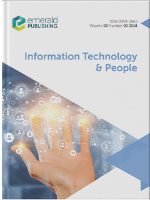
Information Technology & People
Transforming how we understand technology's impact on humanity.Information Technology & People is a renowned academic journal published by Emerald Group Publishing Ltd, dedicated to advancing insights in the intersection of technology, organizational context, and human behavior. Established in 1990, the journal has extensively contributed to the field of Computer Science Applications, Information Systems, and Library and Information Sciences, reflecting top-tier research as evidenced by its Q1 quartile ranking in 2023 across these categories. With a notable Scopus ranking, including a percentile of 91st in Library and Information Sciences, it serves as an essential resource for researchers, professionals, and students eager to explore contemporary issues and innovations in the deployment and impact of information technology on society. While not operating under an open access model, the journal provides a gateway to pivotal studies and findings that shape the future of IT and its implications for people and organizations. Located in the United Kingdom, Information Technology & People continues to be a vital platform for disseminating cutting-edge research that bridges the gap between technology and human experience.
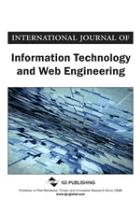
International Journal of Information Technology and Web Engineering
Empowering Researchers in Web EngineeringInternational Journal of Information Technology and Web Engineering, published by IGI GLOBAL, is a pivotal platform for the dissemination of cutting-edge research in the fields of information technology and web engineering. With its ISSN 1554-1045 and E-ISSN 1554-1053, this journal has been effectively contributing to the academic landscape since its inception in 2006, aiming to bridge theoretical frameworks and practical applications in an increasingly digital world. As a recognized Q3 journal in the realm of Computer Science (miscellaneous), it ranks 122 out of 232 in Scopus' classification, positioning it amidst the active discussions and developments within the IT and web engineering communities. The journal not only serves as an invaluable resource for researchers and educators but also encourages students and practitioners to explore innovative methodologies and technologies that shape the future of the digital landscape. Although it is not currently an open-access journal, its contributions are indispensable for advancing knowledge and fostering collaboration within the global research community.
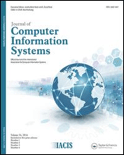
JOURNAL OF COMPUTER INFORMATION SYSTEMS
Advancing Knowledge in Computer Information SystemsThe JOURNAL OF COMPUTER INFORMATION SYSTEMS, published by Taylor & Francis Inc, is a prestigious academic journal dedicated to the fields of computer science and information systems. With an ISSN of 0887-4417 and an E-ISSN of 2380-2057, this journal has been a valuable resource since its inception in 1995, contributing to the convergence of research until 2024. The journal holds significant status in its respective categories, achieving a Q2 ranking in Computer Networks and Communications, and a Q1 ranking in Education, demonstrating its impact and relevance to a broad academic audience. With Scopus rankings placing it in the 90th percentile for Social Sciences - Education and respectable standings in Computer Science, it serves as a critical forum for the dissemination of innovative research, methodologies, and case studies within the domains of computer information systems. Although not an open-access journal, it remains a highly cited source, attracting researchers, educators, and professionals seeking to enhance their knowledge and contribute to the evolving discourse in technology and education.
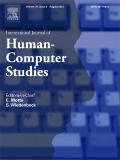
INTERNATIONAL JOURNAL OF HUMAN-COMPUTER STUDIES
Connecting Minds: Where Human Factors Meet TechnologyINTERNATIONAL JOURNAL OF HUMAN-COMPUTER STUDIES, published by Academic Press Ltd - Elsevier Science Ltd, stands at the forefront of research dedicated to the dynamic interplay between humans and technology. With a remarkable impact factor reflective of its rigorous academic standards and its prestigious ranking in the Q1 category across vital disciplines such as Education, Engineering, Human Factors and Ergonomics, and Human-Computer Interaction, this journal serves as an essential resource for researchers, professionals, and students alike. Spanning from 1994 to 2024, it showcases pioneering studies that contribute significantly to the understanding of cognitive processes, usability, and the evolving role of technology in society. Despite the absence of Open Access options, access to this journal is facilitated through institutional subscriptions, ensuring that critical findings and advancements are readily available to a global audience. By continuing to publish high-quality research, the INTERNATIONAL JOURNAL OF HUMAN-COMPUTER STUDIES plays a crucial role in advancing the field, fostering innovation, and guiding future research directions.
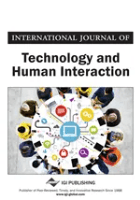
International Journal of Technology and Human Interaction
Bridging the Gap Between Technology and Human BehaviorInternational Journal of Technology and Human Interaction, published by IGI Global, serves as a critical platform for the exploration of the intersection between technology and human behavior, offering an interdisciplinary lens on topics within the realms of Human-Computer Interaction and Information Systems. With an ISSN of 1548-3908 and an E-ISSN of 1548-3916, this journal has been contributing to scholarly discourse since its inception in 2005, with ongoing publication until 2024. Hosting a diverse range of research articles, case studies, and reviews, the journal aims to advance the understanding of how technology influences human experience and interaction patterns in various contexts. Although currently positioned in the Q4 quartile of both Human-Computer Interaction and Information Systems categories, the journal fosters knowledge that aspires to redefine scope and standards within the field. Its commitment to quality research is reflected in its Scopus rankings, showcasing its relevance despite its emerging status in academia. Targeting researchers, professionals, and students alike, the International Journal of Technology and Human Interaction invites contributions that address the pressing challenges and innovations at the nexus of technology and human interaction.

Human-centric Computing and Information Sciences
Unlocking Potential in Human-Computer InteractionHuman-centric Computing and Information Sciences, published by the Korea Information Processing Society, represents a leading platform in the field of computer science, particularly focusing on the interaction between humans and computational systems. With an impressive Q1 ranking in the 2023 category of Computer Science (miscellaneous) and a commendable Scopus rank of #14/232 (94th percentile), this journal has established itself as a cornerstone for researchers and practitioners dedicated to advancing understanding in this vital area. Understanding the significance of making technology more accessible and effective for users, the journal has been an Open Access publication since 2011, promoting wide dissemination of knowledge without barriers. The journal's scope encompasses innovative methodologies, user experience design, and the integration of human factors into computing environments, making it essential reading for anyone interested in the intersection of technology and society. With all articles freely accessible, the journal not only contributes to scholarly discourse but also encourages collaboration among researchers worldwide, fostering further advancements in human-centric computing.

Computers in Human Behavior Reports
Transforming understanding of human-machine interactions.Computers in Human Behavior Reports, published by ELSEVIER, is a distinguished open-access journal dedicated to advancing interdisciplinary research at the intersection of technology and human behavior. Since its inception in 2020, the journal has quickly gained a prominent position in the academic field, attaining Q1 category rankings in multiple areas including Applied Psychology, Artificial Intelligence, Cognitive Neuroscience, Human-Computer Interaction, and Neuroscience (miscellaneous). Its robust standing is evidenced by its exceptional Scopus ranks, particularly in Neuroscience—where it is positioned 4th out of 49 journals—demonstrating a high level of influence and engagement within the community. The journal's aim is to disseminate cutting-edge research findings and foster dialogue among researchers, professionals, and students alike, thereby addressing crucial questions regarding the impact of technology on human behavior and vice versa. As an open-access publication based in the United Kingdom, it not only enhances the visibility of research but also ensures wider accessibility to groundbreaking insights that shape our understanding of human-machine interactions.

Internet Research
Fostering Insight into the Evolving Online LandscapeInternet Research, published by Emerald Group Publishing Ltd, stands as a pivotal peer-reviewed journal in the domains of communication, economics, and sociology. Established in 1991, it has continually advanced the understanding of how the internet influences human interaction, economic behaviors, and sociopolitical structures. With impressive ranking achievements, including Q1 status in Communication, Economics and Econometrics, and Sociology and Political Science, the journal is recognized for its high impact, evidenced by its outstanding Scopus rankings—28th in Sociology and Political Science and 12th in Communication, highlighting its relevance and quality within the academic community. While the journal is not open access, its selective publication of landmark research attracts a dedicated readership of scholars, professionals, and students eager to explore the multidimensional impacts of the digital age. With a focus on innovative methodologies and empirical findings, Internet Research aims to foster scholarly discourse that shapes our understanding of the evolving online landscape through 2024 and beyond.

Australasian Journal of Information Systems
Elevating Discourse in Technology and Society.The Australasian Journal of Information Systems (AJIS), published by the University of Canberra’s Faculty of Information Sciences & Engineering, is a leading open-access journal that has been fostering scholarly communication in the realms of information systems and technology since its inception in 1993. With an ISSN of 1449-8618 and E-ISSN 1326-2238, the journal is headquartered in Australia and provides a platform for innovative research and thought leadership in key areas such as business management, human-computer interaction, and information systems management. Recognized for its quality and impact, AJIS boasts a commendable Q2 ranking in several categories including Information Systems, reflecting its relevance and significance in the academic community. Researchers, professionals, and students alike will find this journal not only instrumental for advancing their knowledge but also essential for engaging with contemporary issues and trends in information sciences. With a commitment to open access, AJIS ensures that high-quality research is widely accessible, fostering collaboration and discourse across international boundaries.
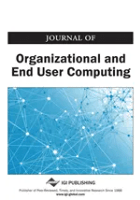
Journal of Organizational and End User Computing
Exploring the Nexus of User Experience and Organizational DynamicsThe Journal of Organizational and End User Computing, published by IGI Global, is a leading peer-reviewed outlet dedicated to exploring the intersection of organizational practices and user interfaces within the digital realm. With a robust ISSN of 1546-2234 and an E-ISSN of 1546-5012, the journal has established itself as a crucial resource for scholars and practitioners in the fields of Computer Science Applications, Human-Computer Interaction, and Strategy and Management. Recognized for its quality, the journal attained Q3 status in Computer Science Applications and Human-Computer Interaction, and Q2 status in Strategy and Management in 2023, reflecting its esteemed position in academic rankings. Operating from the heart of the United States, the journal has converged its focus from 2004 to 2024, making it a reliable source for cutting-edge research and industry trends. Although it does not offer open access, the Journal of Organizational and End User Computing remains an invaluable repository of knowledge, perfect for researchers, professionals, and students seeking to advance their understanding of organizational structures and user engagement in computing environments.